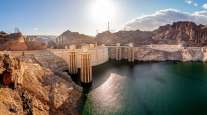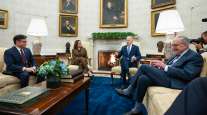Infrastructure Week Spurs Query on Trump's Plan: Where Is It?

Leaders from business, government, organized labor and trade associations gathered in Washington for an annual weeklong discussion about improving the nation’s infrastructure, with a message for President Donald Trump about his $1 trillion plan: Let’s see it.
The officials urged Trump to produce his plan soon if he wants to tap bipartisan support for the improvements and start to navigate the ideological differences over how to pay for them.
“My question to the White House and Congress is this: Where is the bill?” said Richard Trumka, president of the AFL-CIO, appearing by video at an ‘Infrastructure Week’ event at the U.S. Chamber of Commerce in Washington. “It’s ‘go’ time. Bring legislation to the floor, and the labor movement will help you pass it."
RELATED: Sen. James Inhofe — Every funding option for infrastructure plan ‘on the table’
Some of Trump’s biggest campaign promises — such as overhauling the tax code, replacing the Affordable Care Act and building a wall along the Mexican border — face stronger headwinds after he roiled members of both parties last week with his decision to fire FBI Director James Comey. His campaign pledge to invest in the nation’s infrastructure has marked a rare point of agreement with Democrats.
The administration says it will produce details soon. Transportation Secretary Elaine Chao, speaking at the same event, said Trump will share the “vision” for his plan “in the next several weeks.” Chao previously has said there could be a legislative package in Congress as soon as the third quarter.
The plan will include $200 billion in federal funding to leverage $1 trillion of infrastructure investments over 10 years, and the administration is identifying spending offsets, Chao said May 15. States and localities that have secured some funding or financing of their own will be given priority for new federal funds, she said.
“We’re ready to go,” Ed Mortimer, the Chamber of Commerce’s executive director of transportation infrastructure, said May 15. “We need the administration to put something out there.”
RELATED: Capitol Agenda — Infrastructure Week is here
Michael Burke, chairman and chief executive of AECOM, the world’s biggest engineering firm, said he expects the administration to follow a similar process to how it approached overhauling the tax code. It released a one-page list of goals April 26, setting broad parameters as a starting point to begin negotiations with Congress. The infrastructure package would benefit from the same approach, Burke said in an interview.
“Getting the principles out there so that we’ve got something to bat back and forth between the different parties is the first step,’’ Burke said.
Senate Democrats have proposed $1 trillion in new spending on infrastructure without relying on corporate tax credits to attract private investment. Congressional Republicans have emphasized leveraging private investment to pay for improvements to avoid debt.
More than 50 state and national conservative groups sent a joint letter to Congress last week urging lawmakers to avoid passing an infrastructure package that includes “boondoggles,” a term it used to describe the contents of the $787 billion federal stimulus bill in 2009. The signatories included Koch network groups Freedom Partners and Americans for Prosperity, as well as the Club for Growth and Heritage Action for America.
Trump has said he’s counting on Democratic support to get his plan approved and has even suggested he could pair an infrastructure measure with a tax bill to get Democratic votes. But Democratic leaders have said there have been no details about the plan and no conversations with Trump about it.
“We would have to see what they’re proposing before we’d be able to say whether or not we’d be willing to work together on it,” said Caroline Behringer, a spokeswoman for House Minority Leader Nancy Pelosi.
Democratic mayors will be pushing Congress to act, and it’s possible for the party to “keep fighting the good fight” on other matters while agreeing on an infrastructure plan, Los Angeles Mayor Eric Garcetti said in an interview May 15.
“To hold infrastructure hostage is a disservice to the people of America,” Garcetti said. “For Democrats, this is not a favor to Republicans; this is a favor to their constituents.’’




